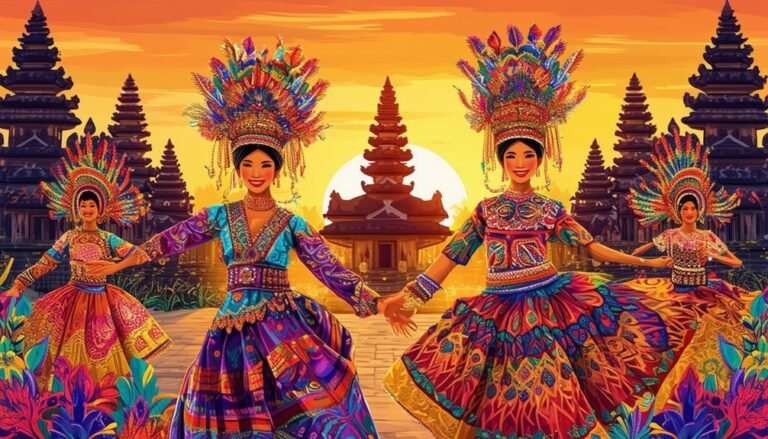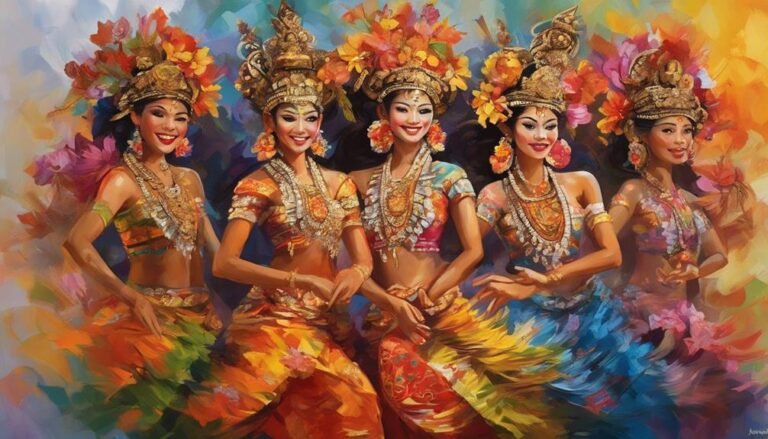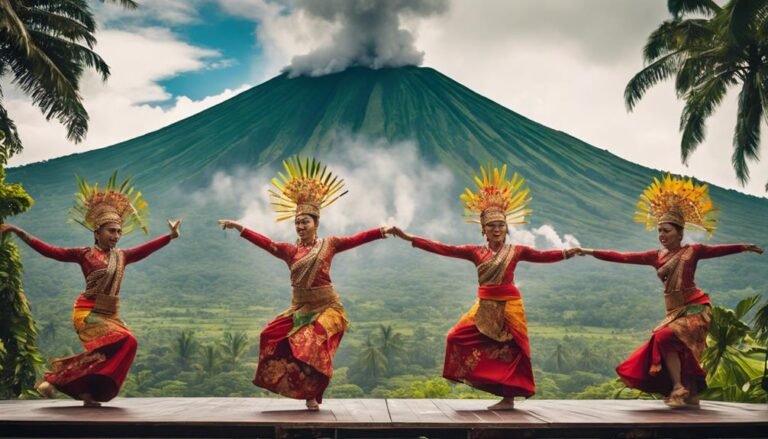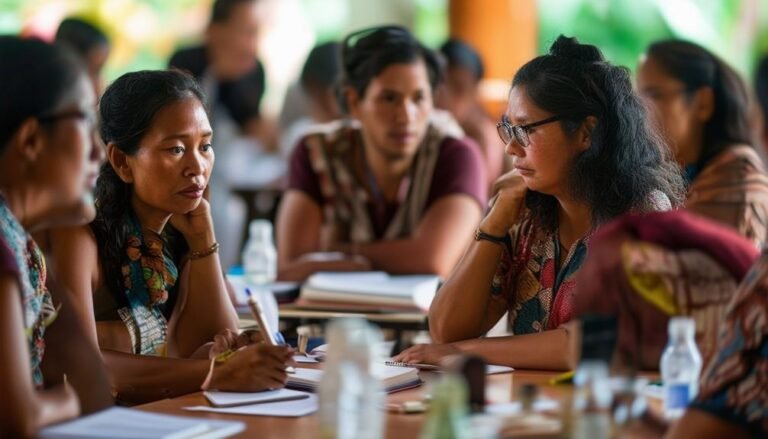Sekaten Festival Indonesia
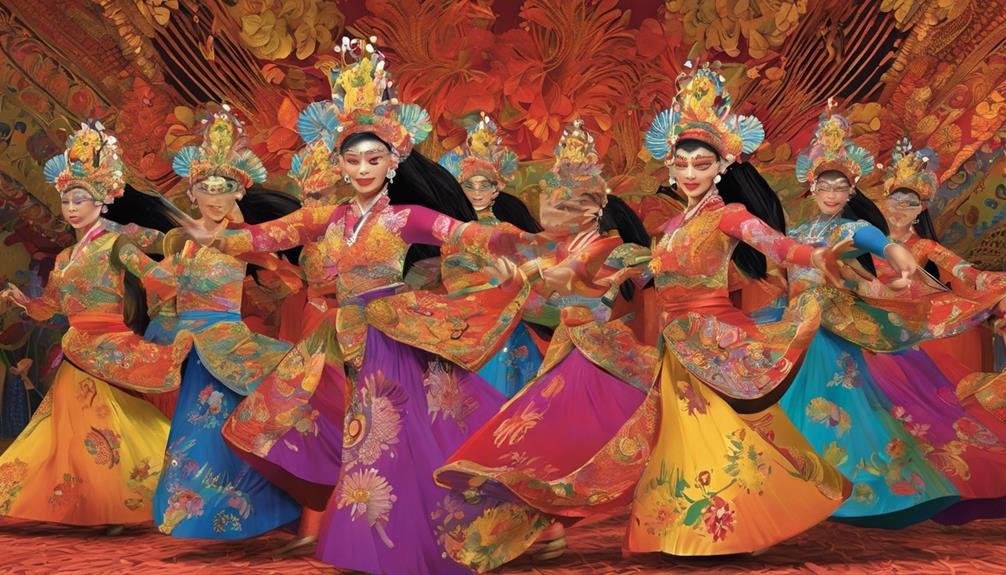
Step into the enchanting world of Indonesia's Sekaten Festival, a magical fusion of spirituality and cultural legacy. Experience the mesmerizing gamelan music echoing through the festival grounds, setting a soul-stirring ambiance. Witness vibrant processions like Garebeg Mulud, where symbolic offerings and grand parades showcase the richness of Indonesian tradition. Engage in immersive rituals like Miyos Gangsa and Numplak Wajik, preserving Yogyakarta's unique heritage. The festival serves as a bridge between communities, uniting them in celebration. Each moment immerses you in a harmonious blend of history and festivity, promising an unforgettable journey into Indonesia's cultural mosaic.
Key Takeaways
- Sekaten Festival bridges spirituality and culture in Indonesia.
- Traditional rituals like Miyos Gangsa and Garebeg showcase Yogyakarta's heritage.
- Gamelan music enriches the festival with mesmerizing Javanese melodies.
- Garebeg Mulud procession symbolizes unity and cultural reverence.
- Sekaten Festival celebrates history, Islamic traditions, and community togetherness.
History and Origins of Sekaten Festival
Originating during the time of the Demak Kingdom, the Sekaten Festival is a traditional ceremony that commemorates the birth of the Prophet Muhammad. This celebration intertwines religious practices with folklore tales, creating a unique blend of spirituality and cultural heritage. Within the history and origins of Sekaten lies a mosaic of traditions passed down through generations, each thread weaving together tales of faith and community.
Religious practices during Sekaten reflect the deep-rooted Islamic beliefs of the Javanese people. The festival serves as a time for prayer, reflection, and unity among the community, emphasizing the importance of spirituality in everyday life. Folklore tales surrounding Sekaten add a layer of mystique and enchantment to the festivities, drawing on legends of ancient times to enrich the cultural mosaic of the event.
As you explore the history and origins of Sekaten, you uncover a mosaic of religious devotion and folklore that continues to shape this traditional ceremony into a vibrant celebration of faith and community.
Cultural Significance of Sekaten Celebration
The cultural significance of the Sekaten Celebration in Indonesia shines through its timeless traditions and dynamic blend of spirituality and heritage. This annual event serves as a bridge between the spiritual and cultural domains, embodying the essence of Indonesia's rich cultural heritage and deep-rooted spiritual beliefs.
The Sekaten ceremony isn't merely a commemoration of the birth of Prophet Muhammad S.A.W.; it's a spiritual celebration that unites communities in Indonesia, fostering a sense of togetherness and shared cultural identity. Through specific rituals and processions passed down through generations, participants in Sekaten engage in a profound connection to their past, keeping alive traditions that date back centuries.
The festival culminates in the Garebeg Mulud event, where symbolic offerings and vibrant parades adorn the streets, showcasing the cultural richness and spiritual significance that define the Sekaten celebration in Indonesian tradition. The Sekaten Celebration stands as a confirmation of the enduring legacy of cultural heritage and spiritual devotion within Indonesian society.
Traditional Rituals and Performances
During the Sekaten Festival, immerse yourself in the intricate web of traditional rituals and performances that encapsulate the essence of this cultural celebration. Experience the enthralling Miyos Gangsa, Numplak Wajik, Kondur Gangsa, Garebeg, and Bedhol Songsong ceremonies that hold historical significance and showcase the unique heritage of Yogyakarta.
Through ritualistic music and dance, explore the heart of the Sekaten Festival's traditions and discover a vibrant display of Indonesia's cultural legacy.
Ritualistic Music and Dance
Immerse yourself in the vibrant sights and sounds of the Sekaten festival as ritualistic music and dance take center stage, showcasing the rich traditions of Javanese gamelan arts.
The gamelan ensembles, Kanjeng Kiai Gunturmadu and Kanjeng Kiai Nagawilaga, resonate through the air, enchanting spectators with their intricate melodies.
Specific ceremonial dances like Miyos Gangsa and Numplak Wajik grace the stage, their graceful movements symbolizing spiritual devotion and cultural heritage.
The seamless fusion of music and dance in Sekaten not only entertains but also educates, spreading Islamic teachings and honoring the birth of Prophet Muhammad.
Witness participants engaging in mesmerizing dance movements and musical performances that have been meticulously preserved and passed down through generations, embodying the essence of tradition and unity.
Historical Significance of Sekaten
Originating during the Demak Kingdom era, the Sekaten festival serves as a significant cultural and religious event in Java, showcasing traditional rituals and performances that honor Prophet Muhammad's birth. This festival holds immense historical significance as it reflects the religious influence and cultural integration that took place during that era.
The traditional ceremonies like Numplak Wajik and Garebeg Mulud are deeply rooted in historical context, symbolizing reverence and celebration. Today, Sekaten continues to be celebrated with modern interpretations while preserving its historical essence. The symbolic rituals such as the distribution of Gunungan carry forward the legacy of prosperity and blessings, embodying the festival's rich historical and cultural heritage.
The gamelan music and royal processions further emphasize the festival's traditional roots and enduring significance.
Gamelan Music at Sekaten Festival
Immerse yourself in the enchanting melodies of traditional Javanese gamelan music as it takes center stage at the vibrant Sekaten Festival in Indonesia. The gamelan music sets a mesmerizing ambiance, resonating through the festival grounds with its intricate melodies and rhythmic patterns. Skilled musicians showcase their expertise, playing the gamelan to accompany ceremonial processions and rituals, enhancing the spiritual and festive elements of the celebrations. The unique sounds of the gamelan create a cultural atmosphere that is both lively and deeply rooted in tradition.
| Gamelan Melodies | Festive Ambiance |
|---|---|
| Intricate and rhythmic patterns | Sets a mesmerizing cultural tone |
| Enhances spiritual elements | Resonates through the festival |
| Skilled musicians showcase art | Deeply rooted in tradition |
The historical significance of gamelan music in the Sekaten Festival intertwines with the festival's traditions, adding layers of cultural richness to this vibrant Indonesian celebration.
Garebeg Mulud Procession Highlights
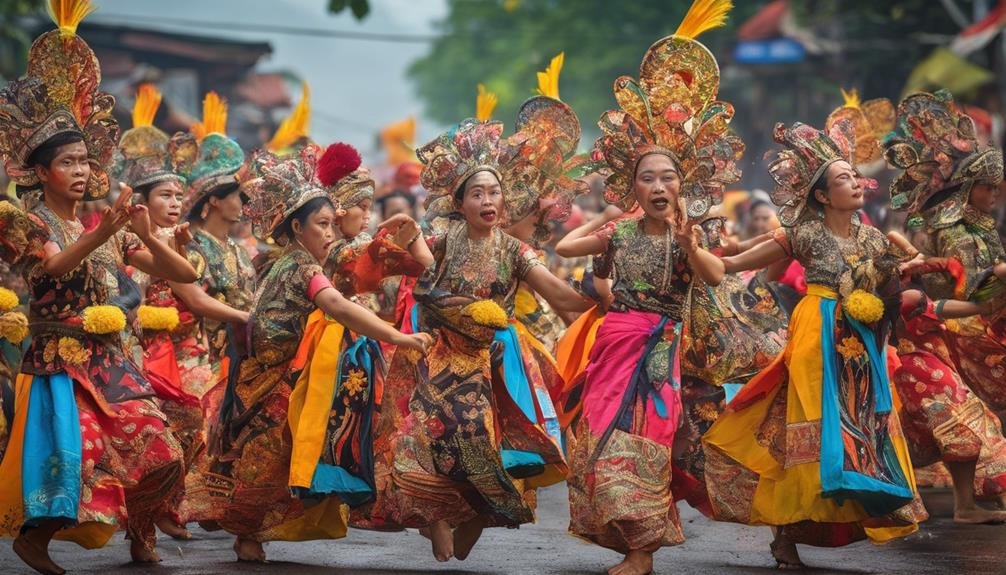
As the Sekaten Festival unfolds in Indonesia, the Garebeg Mulud procession emerges as a vibrant culmination, showcasing a grand display of cultural and spiritual richness. This procession, held on the 12th of Rabiul Awal, is a significant event where Gunungan filled with rice, food, fruits, and vegetables are distributed to various locations.
What sets this moment apart is the presence of palace guards, adorned in majestic uniforms, ensuring the safe distribution of the sacred Gunungan. These offerings, believed to carry blessings, are later planted in fields to bring prosperity and well-being to the community.
The Garebeg Mulud procession stands out as a symbol of unity and reverence, where tradition and spirituality intertwine harmoniously. The sight of the palace guards overseeing the distribution adds a sense of grandeur and solemnity to the ceremony, underscoring the deep-rooted cultural significance and spiritual devotion that define the Sekaten Festival in Indonesia.
Community Engagement and Festivities
Engage actively with the lively cultural celebrations and communal festivities during the Sekaten festival in Indonesia.
The community involvement in Sekaten is profound, with locals actively participating in traditional ceremonies to honor the birth of the Prophet Muhammad. Festivities during the festival encompass engaging processions, enchanting gamelan music performances, and cultural rituals that beautifully showcase the rich heritage of the Yogyakarta Special Region.
Through shared traditions and communal activities, local communities unite to celebrate and preserve the cultural significance of Sekaten. This festival serves as a platform for promoting unity, religious values, and cultural identity among the people in the region.
Residents wholeheartedly engage in various ceremonial practices and rituals during Sekaten, demonstrating their commitment to upholding and passing down their cultural heritage to future generations. Join in the spirit of togetherness and celebration as you immerse yourself in the vibrant array of community engagement and cultural celebration at the Sekaten festival.
Is the Sekaten Festival held at the Indonesian Palace?
Yes, the Sekaten Festival is indeed held at the Indonesian Palace. This traditional Javanese celebration takes place in Yogyakarta and Surakarta to commemorate the birthday of Prophet Muhammad. The Festival of the Indonesian Palace features various cultural performances, traditional markets, and special rituals.
Frequently Asked Questions
Where Is the Sekaten Festival Held?
The Sekaten Festival is held in Yogyakarta, Indonesia. It's a vibrant celebration filled with cultural festivities. Location-wise, it's a significant event hosted at the Keraton Ngayogyakarta Hadiningrat, drawing locals and tourists to experience its rich traditions.
What Is Meant by the Sekaten Ceremony?
In the Sekaten ceremony, you experience the ceremony's significance through cultural practices that combine tradition with Islam. The event commemorates Prophet Muhammad's birth, spreading Islam's teachings through unique processions and rituals.
What Day Does Sekaten Commemorate?
Sekaten festival, a celebration in Javanese culture, commemorates the birth of Prophet Muhammad. It occurs annually from the 5th to the 11th of Rabiul Awal, concluding with the Garebeg Mulud event on the 12th.
What Is the Purpose of the Sekaten Tradition?
The purpose of the Sekaten tradition is to honor Prophet Muhammad and promote unity through cultural celebrations. It aims to preserve cultural heritage and highlight the spiritual significance of his teachings, fostering community solidarity and identity.
Conclusion
Experience the vibrant and rich culture of Indonesia at the Sekaten Festival. From the historical origins to the traditional rituals and performances, this celebration showcases the unique heritage of the country.
The mesmerizing Gamelan music and colorful Garebeg Mulud procession are highlights not to be missed. Engage with the community and immerse yourself in the festive atmosphere of Sekaten to truly appreciate the cultural significance of this annual event.

